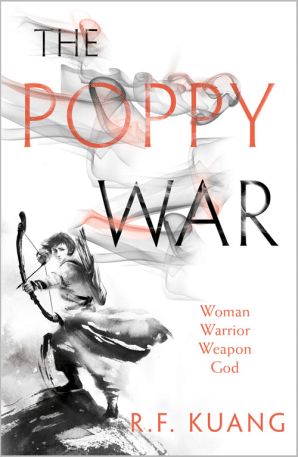When I received a package from my brother several weeks after Christmas, I was surprised to find a book I’d never heard of by an author I’d never read: The Poppy War by R. F. Kuang. Nonplussed but intrigued—my brother is a bibliophile of the first order, and his recommendations are ignored at the reader’s peril—I jumped in.
A week later, I surfaced from the trance the book cast over me, stunned and captivated and a bit terrified by what I’d just read. Here’s why you should give yourself over to the sometimes dark allure of R. F. Kuang’s incredible first novel.
The Story’s Evolution is Startling

I’ve never read a book that morphed in and out of genres as quickly as The Poppy War. Kuang takes readers on a wild ride from Rin’s (the scrappy main character) dead-end hometown to the peaceful terraces of Sinegard Academy to the blasted streets of war-torn Nikara in the span of about 500 pages. She plays with form easily;
- The first third of the book reads a little like Harry Potter-cum-Dragonball Z,
- the second act segues into a gritty war drama whose visual counterpart could be Saving Private Ryan,
- and the final third’s shamanic powers and battles turn into a high fantasy, page-turning race to the finish.
The best part of all of this is that Kuang sticks the landing. I don’t exaggerate when I say that I truly didn’t know where, or in what form, Kuang would take the story next (exaggeration is above my pay-grade here at Nerds on Earth). That sense of mystery is part of what makes The Poppy War so enjoyable.
Its Roots Lie in 20th Century Chinese History
R. F. Kuang is a scholar of Chinese history, particularly during the tumultuous 20thcentury. Her knowledge shines in the parallels in The Poppy War to the country’s past century. The growing threat posed by the Federation of Mugen echoes in the historical expansionism of Japan in the 1930s, especially in the faceless, featureless evil—or are they simply following their conditioning and orders?—of Mugen soldiers.
The ghastly Rape of Nanjing, when Japanese soldiers killed between 200,000 and 300,000 Chinese civilians in 1937-38, is mirrored in the annihilation of the brave inhabitants of Golyn Niis. Speer resembles Taiwan, at least geographically, and an evil doctor oozes evil amorality with the offhand manner of Joseph Mengele. Kuang has stated that Rin’s arc follows that of Mao Zedong.
Even the most casual student of China’s past knows that Mao’s story is full of heartbreak, pain, and death (most of which are not his own); this doesn’t bode well of Rin’s future, but it makes for a fascinating character progression.
The Fantasy Elements are Electric
Kuang introduces the use of magic very slowly, and the buildup pays off with a major plot twist right at the end of Rin’s studies at Sinegard. Far be it from me to spoil such a great story—suffice it to say that what is already a flat-out awesome martial arts epic transforms into a ripping magical epic. Kuang’s love of Chinese culture and mythology really reinforce the feeling inexpressible, dreadful power that comes to dominate Rin’s existence.
The magic also introduces us to Jiang, the whimsical and mysterious Loremaster of Sinegard, and Altan, an enigmatic older student with a dark past and even darker secrets. Our perceptions of magic in this world, and the things shamans can accomplish through it, change constantly as a result of Jiang and Altan. Luckily, Kuang doesn’t hold back; she gives us loads of amazing battles and situations to enjoy the magic in action.
The Main Character is a Study in Contrasts
Rin’s character progression kept me guessing right up to the end of the novel. We sympathize with her struggle to escape a brutal life with her foster family, feel her awe walking the hallowed grounds of Sinegard Academy, and learn about the larger world of Nikara and Mugen through her classes. But as war envelops Nikara and Rin is forced to grow up quickly, she changes almost imperceptibly—characters that we hated because Rin did, or loved because she admired them, are shown in new lights as magic and war take over her life.
By the end, Rin has accomplished something she believes to be necessary, but the cost is so enormous (possibly world-destroying) that I found myself repulsed by the character I had enjoyed for 500 pages. The best part? Kuang does this on purpose, and that makes Rin’s arc so much stronger as a result of her bravery in creating such a complex character.
I heartily recommend R. F. Kuang’s The Poppy War to anyone that enjoys a good story told unflinchingly, rip-roaring action scenes, vibrant world-building, and great historical fiction, because this novel is a stunning success at all of that and more. Go read this book!

